About VA Western NY Healthcare System – Lockport Community Based OP
Lockport VA Clinic offers mental health support including substance use recovery in an outpatient setting. You can access primary care and pharmaceutical services here as well. They are a community based outpatient clinic on South Transit Road in Lockport, New York. Their convenient suburban location streamlines access for veterans from Buffalo, Niagara Falls and Tonawanda. Veterans from these nearby towns benefit from the services provided here. The NY-78 and NY-31 link directly to the clinic via connection to major highways like I-990 and I-190.
The clinic offers free parking access and is wheelchair accessible. The Niagara Frontier Transportation Authority buses serve Lockport. This bus can get you to and from the clinic if you’re local to the area and rely on public transportation. The clinic is within 2.5 miles of Lockport Cave & Underground Boat Ride and Erie Canal Towpath Trail. These are great natural spots to relax and unwind after a long day of therapy. Many eateries like Shamus Restaurants and Script Cafe are nearby in case you feel like grabbing a bite.
Tailored Addiction Recovery For Veterans in Lockport
Lockport VA Clinic offers outpatient addiction recovery for veterans dealing with substance use disorders. This is part of their broader mental health care. It also includes treatment for victims of trauma, PTSD and co-occurring disorders. A co-occurring disorder is when someone struggles with both substance use and mental issues simultaneously.
The great thing about these outpatient mental health care is that you can receive care without disrupting your everyday routine including jobs. I also appreciate that they maintain a high level of confidentiality when delivering care. This makes sense, given the stigma often associated with conditions like substance use disorder. They offer same day help to expedite access to treatment.
Their services comprise consultations, clinical evaluation and therapy delivered in group and individual settings. Their outpatient therapy is recovery focused and geared towards helping you build solid coping mechanisms to prevent relapse. A thorough intake assessment and personalized treatment planning ensures therapy is tailored to your unique recovery needs. This delivers the best recovery outcomes.
Medication For Opioid Use Disorder
You can receive medication assisted treatment in this clinic if you’re dealing with opioid use issues. The technique uses FDA approved meds to curb cravings and eliminate painful withdrawal symptoms. It is backed up with counseling to help you tackle the underlying emotional issues fueling your opioid addiction. This integrated approach helps you stay longer in treatment and facilitates lasting abstinence.
The beauty of their medication assisted recovery is that the clinic provides accessible pharmaceutical services. This makes it convenient for you to get your meds upon prescription and refill them as necessary, ensuring you maintain your medication regimen without hassles. It also helps with proper medication management for treating co-occurring conditions.
Lockport VA Clinic accepts Medicaid, Medicare and Tricare which keeps costs low and ensures broader access among veterans. They can link you up to social services within their VA system that supports lasting recovery as you progress in your healing journey. These may range from housing and employment opportunities to medical care and legal assistance.
Facility Overview
Rehab Score
Gallery
Other Forms of Payment
Self-pay involves paying for treatment out of your own pocket. You can use savings or credit, get a personal loan, or receive help from family and friends to fund your treatment. If you don't have insurance or your insurance plan doesn't cover a specific program, self-pay can help ensure you still get the care you need.
Private insurance refers to any kind of healthcare coverage that isn't from the state or federal government. This includes individual and family plans offered by an employer or purchased from the Insurance Marketplace. Every plan will have different requirements and out of pocket costs so be sure to get the full details before you start treatment.
Military members, veterans, and eligible dependents have access to specific insurance programs that help them get the care they need. TRICARE and VA insurance can help you access low cost or no cost addiction and mental health treatment. Programs that accept military insurance often have targeted treatment focused on the unique challenges military members, veterans, and their families face.
Medicaid is a state based program that helps lower-income individuals and families pay for healthcare. Medicaid covers addiction treatment so those enrolled can use their coverage to pay for rehab. When a program accepts Medicaid the client often pays very little or nothing out of their own pocket.
Medicare is a federal program that provides health insurance for those 65 and older. It also serves people under 65 with chronic and disabling health challenges. To use Medicare for addiction treatment you need to find a program that accepts Medicare and is in network with your plan. Out of pocket costs and preauthorization requirements vary, so always check with your provider.
Financial aid can take many forms. Centers may have grants or scholarships available to clients who meet eligibility requirements. Programs that receive SAMHSA grants may have financial aid available for those who need treatment as well. Grants and scholarships can help you pai for treatment without having to repay.
Sliding scale payments are based on a client's income and family size. The goal is to make treatment affordable to everyone. By taking these factors into account, addiction recovery care providers help ensure that your treatment does not become a financial burden to you or your family, eliminating one barrier to care.
Addiction Treatments
Levels of Care
Intensive Outpatient Programs (IOP) are for those who want or need a very structured treatment program but who also wish to live at home and continue with certain responsibilities (such as work or school). IOP substance abuse treatment programs vary in duration and intensity, and certain outpatient rehab centers will offer individualized treatment programs.
Outpatient Programs (OP) are for those seeking mental rehab or drug rehab, but who also stay at home every night. The main difference between outpatient treatment (OP) and intensive outpatient treatment (IOP) lies in the amount of hours the patient spends at the facility. Most of the time an outpatient program is designed for someone who has completed an inpatient stay and is looking to continue their growth in recovery. Outpatient is not meant to be the starting point, it is commonly referred to as aftercare.
Completing a drug or alcohol rehab program shouldn't spell the end of substance abuse treatment. Aftercare involves making a sustainable plan for recovery, including ongoing support. This can include sober living arrangements like halfway houses, career counseling, and setting a patient up with community programs like Alcoholics Anonymous (AA) or Narcotics Anonymous (NA).
Treatments
Mental health rehabs focus on helping individuals recover from mental illnesses like bipolar disorder, clinical depression, anxiety disorders, schizophrenia, and more. Mental health professionals at these facilities are trained to understand and treat mental health issues, both in individual and group settings.
Programs
Adult rehab programs include therapies tailored to each client's specific needs, goals, and recovery progress. They are tailored to the specific challenges adult clients may face, including family and work pressures and commitments. From inpatient and residential treatment to various levels of outpatient services, there are many options available. Some facilities also help adults work through co-occurring conditions, like anxiety, that can accompany addiction.
VA Wesern New York Healthcare System (Buffalo/Batavia) provides an open, supportive and safe environment to meet the needs of LGBT Veterans and their families. Their program offers individual, family and couples therapy for LGBT Veterans. Therapy is also available for Veterans wanting to explore their sexual orientation/identity further.
Serving in the military is both mentally and physically challenging, and can result in trauma that persists even after combat ends. Military programs are tailored to the specific and often complex needs of active duty personnel, veterans, and military families. Clients often access these programs through the U.S. Department of Veterans Affairs (VA).
Young adulthood can be an exciting, yet difficult, time of transition. Individuals in their late teens to mid-20s face unique stressors related to school, jobs, families, and social circles, which can lead to a rise in substance use. Rehab centers with dedicated young adult programs will include activities and amenities that cater to this age group, with an emphasis on specialized counseling, peer socialization, and ongoing aftercare.
Clinical Services
Cognitive Behavioral Therapy (CBT) is a therapy modality that focuses on the relationship between one's thoughts, feelings, and behaviors. It is used to establish and allow for healthy responses to thoughts and feelings (instead of unhealthy responses, like using drugs or alcohol). CBT has been proven effective for recovering addicts of all kinds, and is used to strengthen a patient's own self-awareness and ability to self-regulate. CBT allows individuals to monitor their own emotional state, become more adept at communicating with others, and manage stress without needing to engage in substance abuse.
Whether a marriage or other committed relationship, an intimate partnership is one of the most important aspects of a person's life. Drug and alcohol addiction affects both members of a couple in deep and meaningful ways, as does rehab and recovery. Couples therapy and other couples-focused treatment programs are significant parts of exploring triggers of addiction, as well as learning how to build healthy patterns to support ongoing sobriety.
Creativity is inherently healing, and can help those in recovery express thoughts or feelings they might not otherwise be able to. Creative arts therapy can include music, poetry/writing, painting, sculpting, dance, theater, sandplay, and more. Unlike traditional art, the final product matters far less than the experience of creation and expression itself.
Experiential therapy is a form of therapy in which clients are encouraged to surface and work through subconscious issues by engaging in real-time experiences. Experiential therapy departs from traditional talk therapy by involving the body, and having clients engage in activities, movements, and physical and emotional expression. This can involve role-play or using props (which can include other people). Experiential therapy can help people process trauma, memories, and emotion quickly, deeply, and in a lasting fashion, leading to substantial and impactful healing.
Research clearly demonstrates that recovery is far more successful and sustainable when loved ones like family members participate in rehab and substance abuse treatment. Genetic factors may be at play when it comes to drug and alcohol addiction, as well as mental health issues. Family dynamics often play a critical role in addiction triggers, and if properly educated, family members can be a strong source of support when it comes to rehabilitation.
Group therapy is any therapeutic work that happens in a group (not one-on-one). There are a number of different group therapy modalities, including support groups, experiential therapy, psycho-education, and more. Group therapy involves treatment as well as processing interaction between group members.
In individual therapy, a patient meets one-on-one with a trained psychologist or counselor. Therapy is a pivotal part of effective substance abuse treatment, as it often covers root causes of addiction, including challenges faced by the patient in their social, family, and work/school life.
Nicotine Replacement Therapy (NRT) is a way of getting nicotine into the bloodstream without smoking. It uses products that supply low doses of nicotine to help people stop smoking. The goal of therapy is to cut down on cravings for nicotine and ease the symptoms of nicotine withdrawal.
Nutrition therapy, aka medical nutrition therapy (MNT), is a way of treating physical, emotional, and medical conditions through diet. Specific dietary plans are designed by professional nutritionists or registered dietitians, and patients follow them in order to positively affect their physical and mental health.
The behavioral health care staff is available to help Veterans and their families manage and overcome the symptoms of PTSD. Treatment can reduce symptoms by helping the Veteran and his or her family develop coping techniques to manage the condition. Unfortunately, because of misunderstanding about PTSD, many Veterans may not seek treatment. Individual therapy usually focuses on reducing distress from reminders of the individual traumatic experience. Group therapies may help the Veterans understand that they were not alone in their reaction to the military service. While PTSD may be a chronic condition with periodic return, treatment can help the Veteran understand and deal with the life-changing nature of the trauma. PTSD can be understood.
Amenities
-
Residential Setting
Staff & Accreditations
Staff
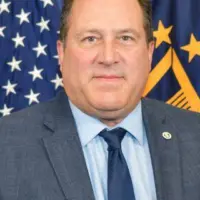
Michael J. Swartz
Healthcare System Director
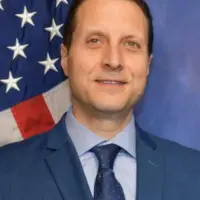
Philippe Jaoude, M.D.
Chief of Staff
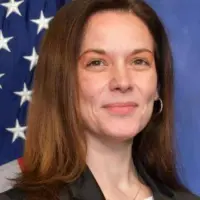
Samantha Gugenberger, MSN, RN, NEA-BC
Chief Nurse Executive & Associate Director Patient Care
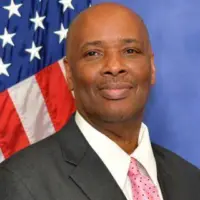
Royce G. Calhoun
Associate Medical Center Director
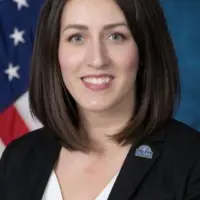
Danielle Bergman, MS, BA
Assistant Medical Center Director
Accreditations

The Joint Commission, formerly known as JCAHO, is a nonprofit organization that accredits rehab organizations and programs. Founded in 1951, the Joint Commision's mission is to improve the quality of patient care and demonstrating the quality of patient care.
Joint Commission Accreditation: Yes
Accreditation Number: 156426
Contact Information
5725 South Transit Road
Lockport, NY 14094-5864
